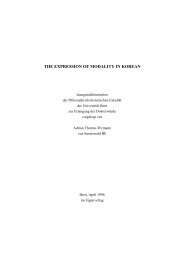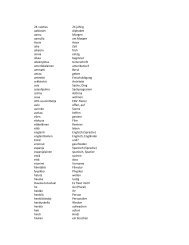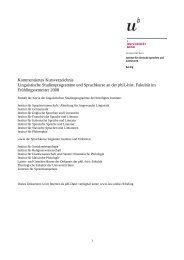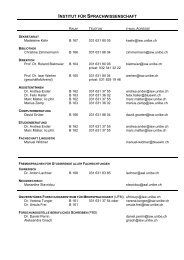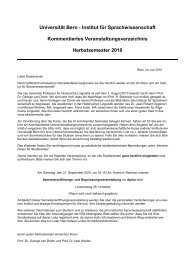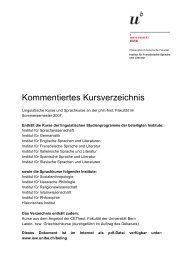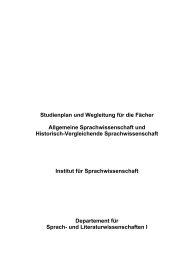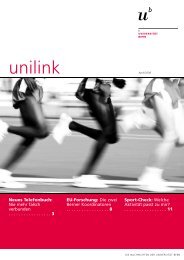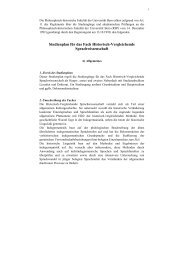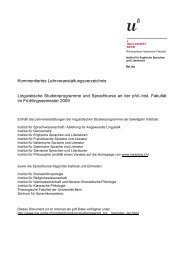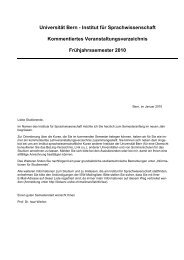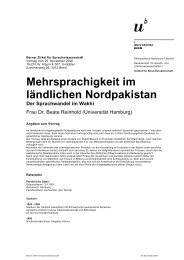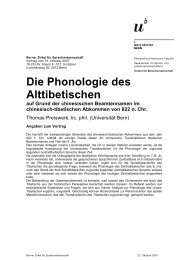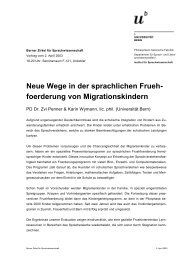BeLing HS 07 - Institut für Sprachwissenschaft - Universität Bern
BeLing HS 07 - Institut für Sprachwissenschaft - Universität Bern
BeLing HS 07 - Institut für Sprachwissenschaft - Universität Bern
Sie wollen auch ein ePaper? Erhöhen Sie die Reichweite Ihrer Titel.
YUMPU macht aus Druck-PDFs automatisch weboptimierte ePaper, die Google liebt.
Level:<br />
BA/MA: Third-year students<br />
Liz: Students in their basic studies<br />
Credit Points: BA/MA: 2/Liz.: 3<br />
Open to students as Wahlbereich? Yes<br />
No<br />
Content: Anthropological linguistics is concerned with the place of language in its wider social and cultural<br />
context. It understands and studies language as a social tool and speaking as a cultural practice. This lecture<br />
course aims to introduce students to some fundamental issues raised in this exciting field of inquiry. It will provide<br />
an overview of key topics in anthropological linguistics and will be concerned with the most important<br />
methodological approaches used in this field. By engaging critically with theoretical perspectives developed in this<br />
discipline and by examining a wide range of ethnographic case studies from various sociocultural contexts, we will<br />
aim to deepen our understanding of the complex and intricate relationships between language, thought, culture<br />
and identity. Topics to be addressed will include: meaning in language; the interconnections between language,<br />
practice and culture; questions of cultural diversity, linguistic relativity and linguistic universals; language<br />
socialisation and identity formation; cross-cultural variability in verbal interaction (with special emphasis on<br />
questions of social positioning and power); ritual, performance and verbal art.<br />
Although the course is designed as a lecture, students are encouraged to take an active part in some of the<br />
analyses and discussions.<br />
Texts: Reading material will be distributed throughout the course.<br />
Aims: To introduce students to some fundamental issues in anthropological linguistics and to deepen their<br />
understanding of the interconnections between language and culture.<br />
Credit: Credits for the course are based on regular attendance and completion of all course work and<br />
evaluations.<br />
Evaluation (Leistungskontrolle):<br />
Test/Exam<br />
Oral Presentation<br />
Evaluation at end of entire Module only<br />
Date of Evaluation:<br />
Throughout semester<br />
During semester break<br />
Other:<br />
Written Assignment(s)<br />
Other Class Work<br />
Other:<br />
Last week of semester<br />
To be advised<br />
MA ENGLISH LINGUISTICS<br />
MA Course Module:<br />
M1<br />
LIZ:<br />
Seminar<br />
Title:<br />
Research Methodology in Linguistics<br />
Instructor(s):<br />
R. J. Watts<br />
Time(s): Wednesday 10-12<br />
First Session(s): 26.9.<strong>07</strong><br />
Level:<br />
BA/MA: MA students<br />
Liz: Students in their main studies<br />
Credit Points: BA/MA: 6/Liz.: 7<br />
Open to students as Wahlbereich? Yes<br />
No<br />
Content: The present course is designed as a seminar for Lizentiat students and as the first module in the MA<br />
programme in "English Linguistics". We shall consider the problems of research design, methodology and data<br />
analysis required at the level of the Masters degree and higher. The wide range of topics in English linguistics<br />
available for students to choose from will mean that we need to take as broad a view of the topic as possible,<br />
including work on theoretical aspects of language structure, empirical work of an experimental nature, fieldwork of<br />
all kinds, the techniques of transcription and data analysis, statistical analysis, etc. We will consider the goals of<br />
the research, the kinds of data we might need for the analysts, the structure and design of various projects, the<br />
gathering and analysis of data and the presentation of results. Some of the many questions that concern us here<br />
are: How do I deal with the research literature in the area chosen? How do I focus on a specific research issue or<br />
complex of issues? How do I go about gathering data, i.e. how do I sample and /or research informants? What do<br />
I need to consider when I choose an appropriate research design, e.g. quantitative, qualitative, both or neither?<br />
27



